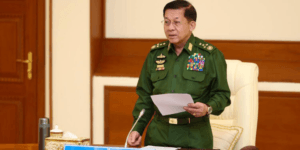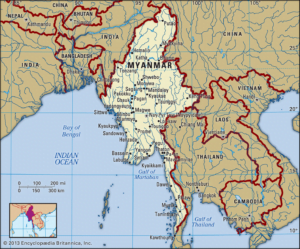Arakan Army Chief Denies Crimes Against Rohingyas

In response to allegations of the Arakan Army (AA) attacking Rohingya civilians in northern Rakhine State, the AA chief Major General Tun Myat Naing discusses the politicization of the Rohingya issue since the 1950s.
Interviewer: There are reports of the Arakan Army (AA) attacking Rohingya civilians on August 5 and 6. The AA has denied these claims. Do you have evidence to refute these allegations?
Tun Myat Naing: There have been numerous allegations both before and during the seizure of Buthidaung. When discussing the situation in Rakhine State, it’s challenging to provide a single, straightforward answer.
We need to consider the context. During World War II, Muslim communities in the Rakhine border region fought alongside the British. The British armed these communities, and the weapons were used in violent conflicts against the Rakhine people, causing significant loss of life.
This historical backdrop has fueled a cycle of animosity and mistrust between the communities. In the 1950s, Bamar politicians manipulated tensions between the Rakhine and Muslim communities for their own gain.
The current regime is exacerbating these tensions by arming and training Muslim groups and framing their struggle as a divine mission and rightful claim to the land.
Bamar political and military leaders have long manipulated ethnic and religious conflicts for their own interests, fueling animosity between communities.
The situation has deteriorated significantly under the current regime. The conflict, which has its roots in World War II, and was exacerbated by U Nu’s government, saw further complications under Thein Sein’s regime. The AA was officially established in 2009 and fully operational by 2014.
Under State Counselor Daw Aung San Suu Kyi, the military exploited these conflicts to undermine the elected government. However, their actions spiraled out of control, leading to severe consequences. After the 2021 coup, their desperation led them to take increasingly reckless action, including arming the Rohingya and forming alliances with terrorist groups like ARSA. They betrayed their duty and ethical responsibilities as an army to the country and its people.
I appreciate the information. Both international and domestic media have reported that the military regime has been providing weapons and training to the Rohingya, including groups like ARSA and the Rohingya Solidarity Organization (RSO). Captured military personnel have confirmed these activities. Do you have any more evidence or updates?
We have gathered evidence and witness accounts following our seizure of the military headquarters in Buthidaung. We confiscated computers, official documents detailing orders and apprehended officers responsible for carrying out those orders. We also obtained data from their phones. The evidence we have is more than enough, but we are withholding some of it during wartime. It includes information about individuals who ordered the burning of villages to blame the AA and escalate conflicts.
When will the media and human rights organizations addressing the Rakhine crisis see this evidence?
Although we have substantial evidence, we can only disclose a portion of it. Even though the enemy has retreated, we have not achieved total victory yet. In future confrontations, if we have used up all our options, we may face new challenges. Therefore, we cannot reveal all the sensitive information at this time. We are currently facing severe allegations and criticism and need to keep it classified for now. We are prepared to disclose some evidence obtained from mobile devices, but technological evidence and certain witness testimonies will remain confidential for now.








